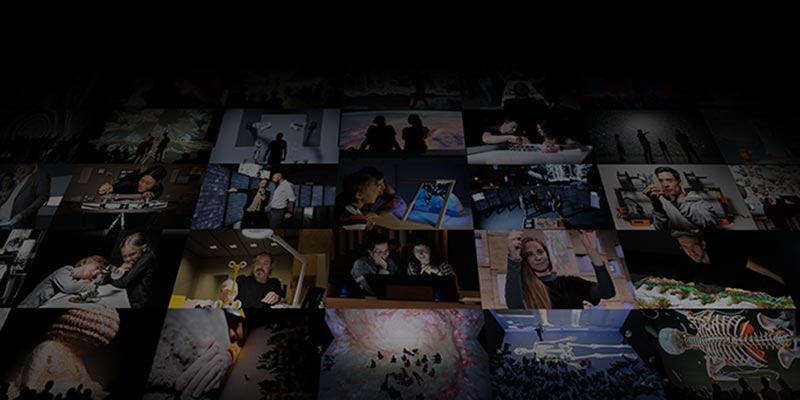Following last year’s brilliant 40-year festival, which brought more artists, exhibitors and international experts to Linz than ever before, this year Ars Electronica is going on a journey, or rather the festival itself is becoming a journey – a journey through “Kepler’s Gardens”, which are not just located in Linz at the JKU Campus but also 120 other locations worldwide.
With Home Delivery we are exploring gardens across the world in this special Inside Festival segment that spans the continents from the Adriatic sea, across Russia, to Thailand.
Adriatic Garden | aqua_forensic 2.0 connects two places on the Adriatic Sea: Dubrovnik (HR) and Koper (SI), giving special attention to a commitment to the values of care, compassion, environmental justice, action-taking and cooperation with the Adriatic Sea and its creatures. The project framework is the aqua_forensic, ongoing art and science research method, developed by Robertina Šebjanič (SI) and Gjino Šutić (HR), which sheds light on the presence of invisible anthropogenic (pharmaceutical) chemical pollutants in the water environment. The program Adriatic Garden | aqua_forensic 2.0 at Ars Electronica Festival 2020 focuses on ecological and climatic changes/challenges of the Adriatic Sea. A distributed exhibition program will be presented in Dubrovnik, Koper, Ljubljana and Linz. The citizen science workshops with a global and local audience will focus on the topics of water pollution and climate change. The Adriatic Garden online platform will enable audiences to immerse themselves in the underwater world of the sea by video and listen to the soundscapes under/above water in the sonic wilderness of the Adriatic. The sound program is co-curated by Robertina Š., Gjino. Š., Manja Ristić (SB) and Marko Vivoda (SI). Art, science and citizen science coalesce within the framework of Adriatic Garden | aqua_forensic 2.0, opening up a wider discussion on our solidarity and empathy with waters beyond human perception.
Project Adriatic garden is supported by: UR Institute (HR), PiNA (SI), Project Atol (SI); City Gallery in Ljubljana (SI) and Ars Electronica / STARTS programme
Meanwhile in the Ars Electronica Garden Moscow, Datasets vs Mindsets curators Helena Nikonole (RU) and Olga Vad (RU) look into Post-Soviet explorations of the digital control society. As a huge part of the processes around us are digitized, becoming datasets that can be analyzed by a variety of dynamic algorithms which don’t only recognize and process incoming information, but also identify and predict patterns in its changes at speeds and scales inaccessible to human perception. Digitization ranks among the most important national prerogatives of many post-Soviet countries. In its own way, the local context transforms the understanding and implementation of digital tools. These algorithms, often based on machine learning, have a number of limitations, and the so-called biases ― which they learned from the data on which they were trained― form feedback loops that influence what takes place in the physical world, and create opportunities for various forms of so-called algorithmic control. This project is dedicated to the artistic exploration of the boundaries between digital and physical spaces, and the spectrum of phenomena and consequences of the implementations of algorithmic regulation and control tools in the post-Soviet context. The project aims to present several generations of new media artists from post-Soviet countries in the international context. It includes an exhibition, a one-day conference and a one-day performance program using innovative forms of representation and interaction between online and offline formats, such as new approaches to webcasting and experimental web-interfaces, which create brand-new user experiences for online visitors.
As you join the Psych Garden in Thailand from home, watching through your own computer frame, travel takes on a whole new meaning. Viewers move through experiences that explore panpsychism and animism rooted in Thai culture, asking visitors to wonder: How do we understand planets, inanimate objects, engineered microorganisms, etc. through a cultural framework? How do scientists, anthropologists, and artists outside the Western canon formulate their perception of the observed world? Jennifer Katanyoutanat and Scott Kildall have each created different ways to share remote sensations. With collaborator Michael Ang, Scott Kildall has created a live streamed audio installation that gives voice to Thai plants. Jennifer Katanyoutanat and her collaborators Grace Cong Xin Wong and Zden Brungot Svitekova have created a pathway to explore remote sensations through a taste-based guided meditation. Visitors are encouraged to bring their own garlic. Moving on to the wider world, Tentacles and FREAK Lab Thailand investigate the cultural lens of our observed world through three different journeys exploring life, synthetic biology, geopolitics and geology, and the future of space exploration.
Our partner institutions in Bangkok: spaceth and spacezab
Credit: Henry Tan

